Labyrinth of Cinema Blu-ray Movie
HomeLabyrinth of Cinema Blu-ray Movie 
海辺の映画館 キネマの玉手箱 | Limited Edition - 4000 CopiesCrescendo House | 2019 | 179 min | Not rated | Nov 02, 2021
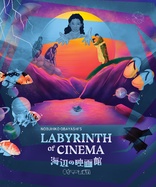
Price
Movie rating
7.7 | / 10 |
Blu-ray rating
| Users | 0.0 | |
| Reviewer | 4.5 | |
| Overall | 4.5 |
Overview
Labyrinth of Cinema (2019)
The story centers on a group of young people who travel back in time when they are in a movie theater just before closing time. They witness deaths during the closing days of Japan's feudal times and on the battlefront in China before they are sent to Hiroshima just before the Aug. 6, 1945, atomic bombing of the city.
Starring: Takato Hosoyamada, Yoshihiko Hosoda, Riko Narumi, Hirona Yamazaki, Takako TokiwaDirector: Nobuhiko Ôbayashi
| Foreign | Uncertain |
| Drama | Uncertain |
| War | Uncertain |
| Fantasy | Uncertain |
| Adventure | Uncertain |
Specifications
Video
Video codec: MPEG-4 AVC
Video resolution: 1080p
Aspect ratio: 1.85:1
Original aspect ratio: 1.85:1
Audio
Japanese: DTS-HD Master Audio 5.1
Japanese: LPCM 2.0
Subtitles
English
Discs
Blu-ray Disc
Two-disc set (2 BDs)
Packaging
Slipcover in original pressing
Playback
Region A (B, C untested)
Review
Rating summary
| Movie | 4.5 | |
| Video | 4.5 | |
| Audio | 5.0 | |
| Extras | 5.0 | |
| Overall | 4.5 |
Labyrinth of Cinema Blu-ray Movie Review
Reviewed by Jeffrey Kauffman October 28, 2021Maybe it's just because ads for The French Dispatch are all over
television right now and so may have brought some of Wes Anderson's stylistic quirks to top of mind, but some may feel like I did after having
watched Labyrinth of Cinema, thinking Nobuhiko Obayashi and Anderson could have at least been comrades in arms (Obayashi died in
2020
from cancer), and maybe even those long lost (distant) cousins that genealogy websites inform people they have. There are a number of
interesting
parallels
between Anderson's overall filmography and Labyrinth of Cinema, including simultaneously unfolding stories that are separated either by
time or place, a certain "meta"* perspective pervading things that includes liberal doses of surrealism as well as a winking nod to the fact within the
film itself that a movie is being viewed, changing aspect ratios, modulations between
color and black and white, a surplus of color in the color sequences, an at times bizarre but whimsical production design, and
even an animated interpolation or two. Obayashi tends to shy away from some of Anderson's predilections toward symmetry in his framings, and
of
course the story here, which revolves around Japan's history and especially the calamity that befell Hiroshima toward the end of World War II,
probably won't end up in any Anderson film. The "Anderson connection" (if indeed anyone else even sees it) may at least provide an entrance
point to Obayashi's dense and at times pretty freewheeling story for some who are otherwise unacquainted with Obayashi.
*The fact that a certain social media giant rebranded itself with a certain word about a nanosecond after this review had been written I am taking
as a "meta meta"
moment
of my own.
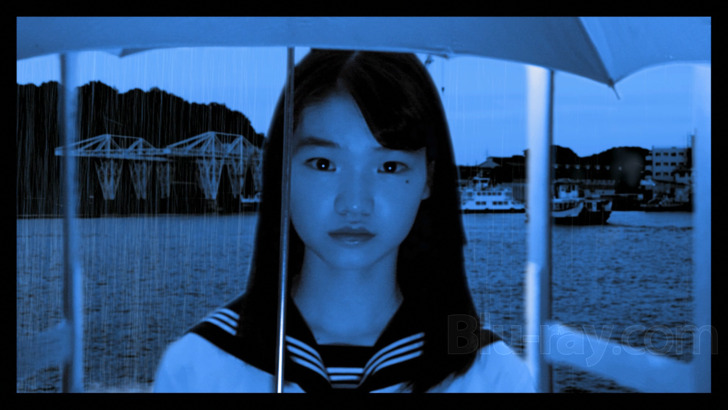
Evidently Obayashi knew his days were numbered as he made Labyrinth of Cinema, and as such the film may serve as a love letter to the movies from the writer, director, producer and editor (all four roles served by Obayashi here, and all inherent to the film's overall power). Trying to summarize Labyrinth of Cinema may be as difficult as Daedalus trying to get out of the darned labyrinth he had built, but I'll try to give at least an overview of an often deliberately disjunctive narrative, while also offering a few thoughts on some of the stylistic quirks on display. That second category is probably up first due to an elaborate and entertaining credits sequence that has narration, a longish sequence kind of oddly devoted to Broadway star Hinton Battle (who is not in the film), bright colorful backgrounds with Japanese text (which is only partly translated at times by English subtitles), with a few interstitial peeks at elements of the tale to come.
Fans of Cinema Paradiso or even the great James Goldman - Stephen Sondheim musical Follies may enjoy a conceit underlying the film, namely that a vaunted entertainment emporium, in this case the sole movie house in Obayashi's home town of Onomichi, is closing its doors, and there's a probably bittersweet celebration of sorts featuring screenings of a lot of Japanese war and/or action films (I might have chosen to focus more on musicals, but Obayashi cheekily works in some song and dance into this film nonetheless, as you'll soon find out). Noriko (Rai Yoshida), a sweet girl who helps around the theater, bikes through a torrential downpour to get to the festivities, where, kind of like the flip side of The Purple Rose of Cairo, she ends up in the movie being screened, which in fact is a musical. A gaggle of other characters also experience this magical transformation, and Labyrinth of Cinema then follows them as they traverse the landscape of whatever is on the screen.
There's an almost ADHD aspect to Labyrinth of Cinema, especially in its first half (the film comes replete with an Intermission). As such viewers pretty much need to surrender (and/or submit, depending on their resistance levels) to a parade of wacky imagery and introductions of characters that kind of waft in and out of the story in an almost psychedelic phantasmagoria. What I found so interesting about Labyrinth of Cinema, though, was how in its second half, Obayashi rather magically starts to develop more of an intimate, emotional tale that is centered on the tragedy of Hiroshima. Suffice it to say the the characters who have jumped into the big screen become what might be thought of as cinematic analogs to the travelers in the fun old Irwin Allen series The Time Tunnel, arriving temporally shortly before the first Atomic bomb is slated to drop on the Japanese city. All at once, Obayashi weaves an almost incredible amount of layers and superimposed timelines and characters together to provide a surprisingly devastating final few minutes (though Obayashi's often cheeky sense of humor may still pervade things even in some of these scenes).
This review barely begins to scratch the surface of what's in store for viewers coming to Labyrinth of Cinema . If the narrative is almost impossibly dense and scattered at the same time, the presentational aspects may be downright exhausting for some. Not only are there often quite funny uses of CGI, Obayashi offers boxes with Japanese text (as in screenshot 8, among others), different aspect ratios are achieved with colorful mattes, overlays appear which then isolate characters in circles, and occasional animated characters from books escape their printed confines to engage in mad, almost silent movie-like, escapades. It's all simply amazing to watch, and as such serves as a perfect reminder of what the medium of film can offer.
Labyrinth of Cinema Blu-ray Movie, Video Quality 
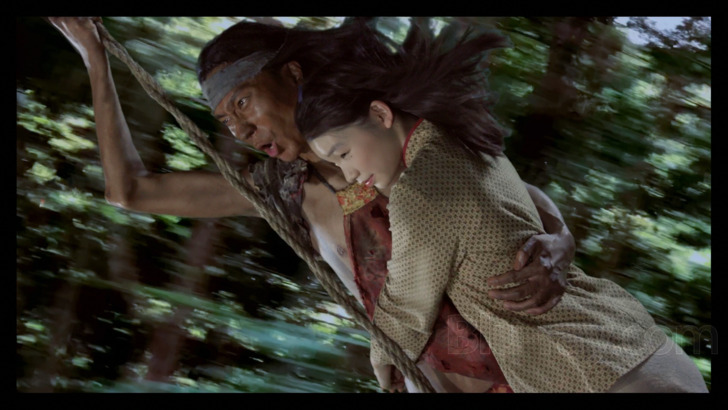
Labyrinth of Cinema is presented on Blu-ray by new label Crescendo House with an AVC encoded 1080p transfer in 1.85:1 (which as can be seen in the screenshots I've uploaded to accompany this review is achieved via windowboxing). According to the IMDb, Obayashi shot Labyrinth of Cinema with Canon EOS models, with a 2K DI. We reviewers often decry an "overly digital" experience, but kind of ironically (and one assumes maybe intentionally provocatively) for a film celebrating "film" (in both its senses). there is an undeniable "video"-like appearance to Labyrinth of Cinema, one which deliberately emphasizes artifice. Obayashi likes to almost "downgrade" his own imagery at times with things like shifting matte lines (which I suspect were achieved digitally, anyway), obviously low grade "special effects" like the "rain" seen in screenshot 1, really hokey looking green screen material and totally bizarre CGI. The result is never less than entrancing to watch, but one has to accept these particular "meta" aspects as part and parcel of Obayashi's stylistic palette. In terms of the actual palette, this presentation offers gorgeous hues which run the gamut from almost garishly bright greens and yellows to more reserved tones when, for example, things get to Samurai times. Fine detail on practical items like props and (especially) costumes is typically superb throughout, while the CGI can be decidedly less sharp (and again, one suspects perhaps intentionally). Aside from the windowboxing issue, which may or may not bother some, there are a couple of very brief moments of what I'd be prone to call banding, as seen in screenshot 19, though they only occur during sequences featuring the screen shown and/or the officer in the frame, and so this may be another instance of Obayashi offering a deliberately degraded, lo-res image.
Labyrinth of Cinema Blu-ray Movie, Audio Quality 
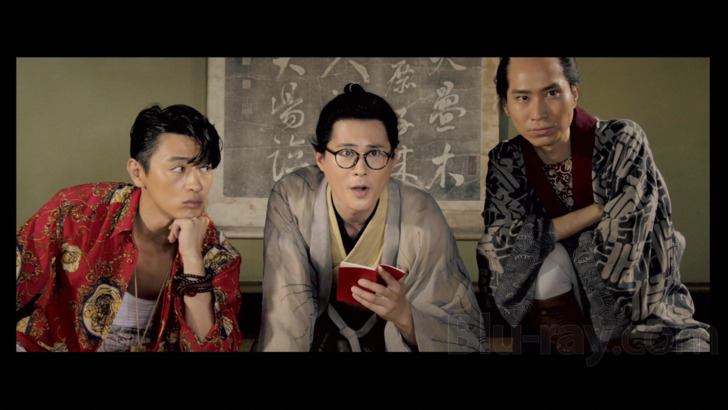
Labyrinth of Cinema features DTS-HD Master Audio 5.1 and LPCM 2.0 tracks. The surround track is definitely advised for those with the setup for it, as the increased immersion and especially force in the mid and low ranges is immediately noticeable with the fun music underlying the colorful credits sequence. Because so many of the films within the main film offer at least some supposed action elements, sound effects can regularly engage the side and rear channels. There are a number of goofy effects that tend to be the aural equivalent of some of the equally out there visuals on display. Dialogue is rendered cleanly and clearly throughout. Optional English subtitles are available, and the film offers what Crescendo House has told me are kanji and kana subtitles at times, both at the bottom of the frame and also within the text boxes I mention in the main body of the review.
Labyrinth of Cinema Blu-ray Movie, Special Features and Extras 
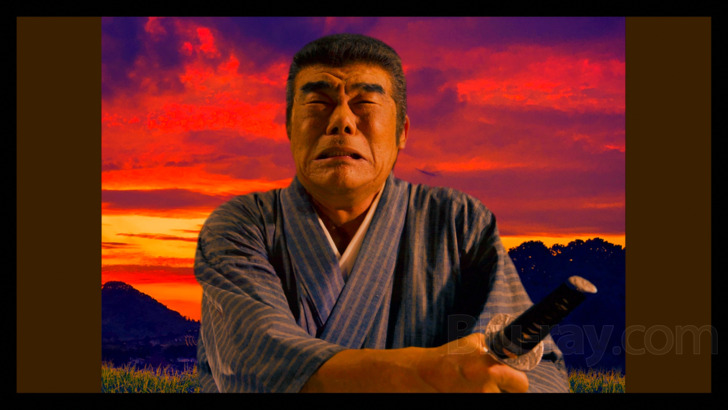
Disc One - Feature Film
- Introduction (HD; 1:37) is a charming if brief piece with Kyoko Obayashi, the widow of the filmmaker, and their daughter Chigumi.
In Japanese
with English subtitles.
Note: It is possible to play the film either with this introduction or without it.
- Making Of Documentary (HD; 56:33) is a nicely done assemblage of material, including quite a bit of candid footage of Obayashi which now probably unavoidably has a bittersweet quality to it. In Japanese with English subtitles.
- A Conversation with Mrs. Obayashi (HD; 17:33) features Obayashi's widow's reminiscences about the film in another featurette that is very sweet (and again maybe bittersweet, especially when Mrs. Obayashi references how her husband's death has affected her memories). In Japanese with English subtitles.
- Festival Trailer (HD; 00:31)
- Japanese Trailer (HD; 00:55)
- US Trailer (HD; 1:40)
Labyrinth of Cinema Blu-ray Movie, Overall Score and Recommendation 
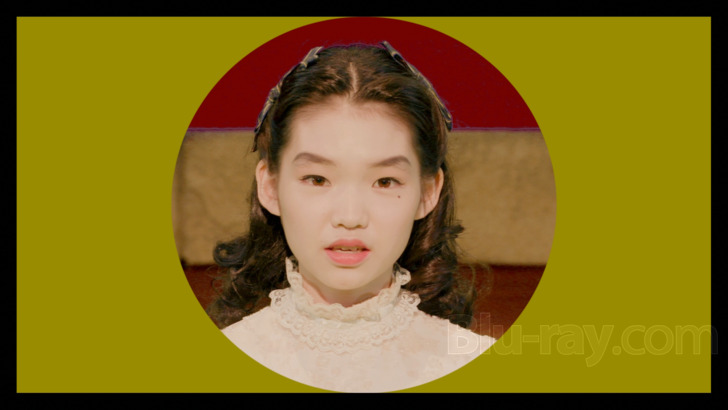
For those who have had some previous exposure to Obayashi courtesy of something like House, some of the over the top aspects of Labyrinth of Cinema may be at least relatively more expected. For anyone who hasn't encountered an Obayashi film before, just take a deep breath, assure yourself that you'll probably be more or less intact by the time you get through it, and enjoy the stream (some might argue torrent) of consciousness approach the film takes as it cartwheels through an assortment of supposed "other" films within this film. I know I'm not alone in feeling like we have to watch too many cookie cutter entertainments, and whatever deficits Labyrinth of Cinema may have, it is at least squarely sui generis. Crescendo House is off to a good start with this release, which features secure technical merits, good supplements and nice packaging. Highly recommended.
Similar titles
Similar titles you might also like

Akira Kurosawa's Dreams 4K
夢 / Yume
1990

The Little House
小さいおうち / Chiisai ouchi | Limited Edition to 3000
2014

The Human Condition III: A Soldier's Prayer
人間の條件 / Ningen no jôken / Parts 5 and 6
1961

Fires on the Plain 4K
野火 / Nobi
1959

Story of a Prostitute
春婦伝 / Shunpu den
1965

Wooden Crosses
Les croix de bois
1932

The Front Line
고지전 / Go-ji-jeon
2011

Hell in the Pacific
1968

The Painted Bird
Nabarvené ptáce / Slipcover in Original Pressing
2019

Many Wars Ago
Uomini contro
1970

The Bridge
Die Brücke
1959

The Burmese Harp 4K
ビルマの竪琴 / Biruma no tategoto
1956

Diamonds of the Night
Démanty noci
1964

Shame
Skammen
1968

Le Petit Soldat
The Little Soldier
1963

La Grande Illusion
Grand Illusion
1937

Ugetsu 4K
雨月物語 / Ugetsu monogatari
1953

The Human Condition I: No Greater Love
人間の條件 / Ningen no jôken / Parts 1 and 2
1959

Ivan's Childhood
Ива́ново де́тство / Ivanovo detstvo
1962

Come and See
Иди и смотри / Idi i smotri
1985